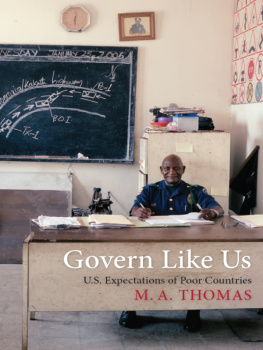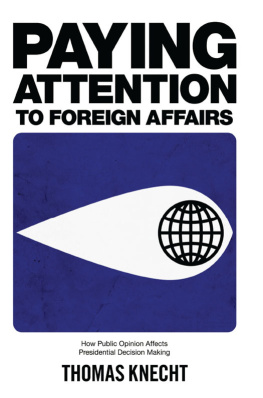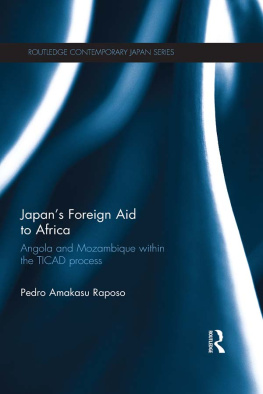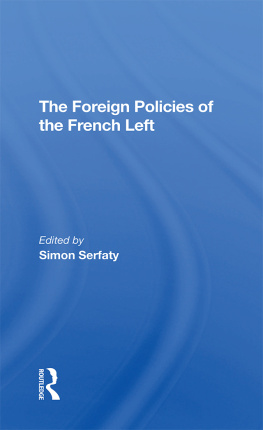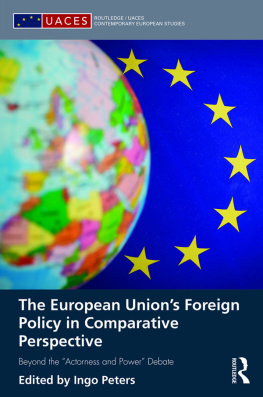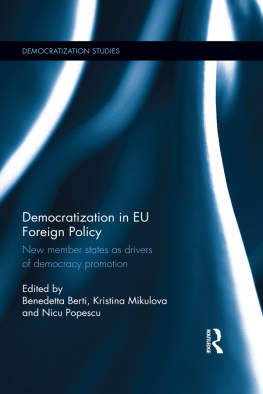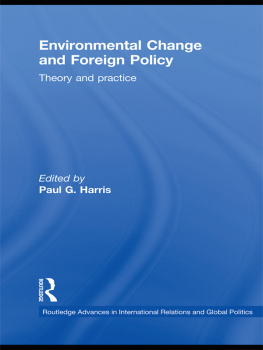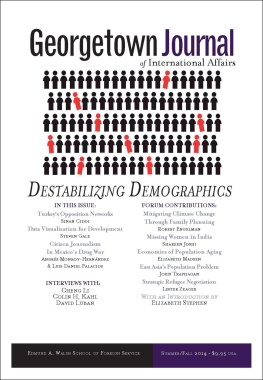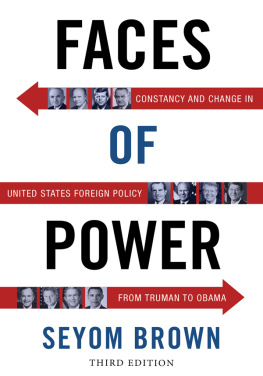Govern Like Us
Govern Like Us
U.S. Expectations of Poor Countries
M. A. THOMAS
Columbia University Press
New York
Columbia University Press
Publishers Since 1893
New York Chichester, West Sussex
cup.columbia.edu
Copyright 2015 Columbia University Press
All rights reserved
Library of Congress Cataloging-in-Publication Data
E-ISBN 978-0-231-53911-1
Thomas, Melissa Annette.
Govern like us : U.S. expectations of poor countries / M.A. Thomas.
pages cm
Includes bibliographical references and index.
ISBN 978-0-231-17120-5 (cloth : alk. paper) ISBN 978-0-231-53911-1 (electronic)
1. Developing countriesPolitics and government. 2. Public administrationDeveloping countries. 3. PovertyPolitical aspectsDeveloping countries. 4. Political cultureDeveloping countries. 5. Developing countriesForeign relationsWestern countries. 6. Western countriesForeign relationsDeveloping countries. I. Title.
JF60.T48 2015
320.91724dc23
2014025326
A Columbia University Press E-book.
CUP would be pleased to hear about your reading experience with this e-book at .
COVER PHOTO: Jan Banning/www.janbanning.com
COVER DESIGN: Milenda Nan Ok Lee
References to websites (URLs) were accurate at the time of writing. Neither the author nor Columbia University Press is responsible for URLs that may have expired or changed since the manuscript was prepared.
Contents
Writing this book was a challenge. I have benefited from seven years of field research, but I have been unable to call on any of that work explicitly for this book. The interviews I conducted and the reports I wrote were confidential and for other purposes. Academia would have liked me to attempt to conduct some of these interviews over again so that I could quote people, but it was simply not possible for reasons of both cost and access. Instead, I was obliged to support and illustrate my argument where I could by drawing on the existing secondary literature.
Much of it is already there, if fragmented across the disciplines and buried in technical jargon. Many parts of this puzzle have been considered and explored by political scientists, economists, sociologists, lawyers, and aid practitioners. Part of the reason why our foreign policy has lagged beyond the insights from the academic and practitioner worlds is because those insights are not always easily available to the general audience. As a lawyer and a political economist, I understand terms like ethnolinguistic fractionalization, neopatrimonialism, purchasing power parity, constitutive theory of statehood, and tax effort, but I saw no reason to burden the reader with them. Ive tried to keep it straightforward, albeit sometimes at the expense of nuance.
I owe enormous thanks to many people and can only thank a few of them here. Thanks to Francis Fukuyama, who hired me at SAIS and was kind enough to read and comment on the manuscript; to SAIS, which gave me a home while I was writing it; to the Max M. Fisher Excellence in Teaching Award that helped me write the first paper that crystallized this line of thought in 2008, and to Policy Review that eventually published it; to the foundation that provided grant support and the program officer whose demand for regular updates helped keep me to the task; to mentors and colleagues Robert Bates, Deborah Brautigam, Thomas Carothers, Gerald Hyman, Seth Kaplan, and Richard Messick for their unflagging encouragement, comments on the manuscript, and advice on dealing with the publishing world; to research assistants Nate Hanson, Rachel Ort, and Megan Vaughn-Albert; to SAIS students that devoured and mercilessly shredded parts of the manuscript like a school of intellectual piranhas; to the colleagues, friends, and family who encouraged me and patiently bore my unavailability as I worked on the book; to the people who opened their homes, lives, and hearts to me over the years as I learned about governance in poor countries.
The United States has been embroiled in Afghanistan in the longest running war in its history, so long that I now teach graduate students who barely remember the attack on New York and Washington, D.C. on September 11, 2001. The objective of the United States and its Coalition partners in Afghanistan was not simply to rout the Taliban government and its al Qaeda alliesthis was accomplished quickly and effectively in 2001. Instead, it has been to change the way Afghanistan is governed on the theory that a stable, prosperous, and well-governed country would provide no future foothold for terrorism. To do this, they sought to create a government that governed according to the American, and more broadly, Western governance ideal: a constitutional democracy operating under the rule of law that protects human rights and delivers public goods and services to its citizens, such as security, economic opportunity, health, education, and infrastructure.
These objectives dovetailed with those of people in the development community who seek generally to improve the welfare of the poor. In fact, many in the development community had been quick to argue after the attack that poverty causes terrorism and that development is the solution. In March 2002, the United Nations secretary general spoke at a meeting of fifty countries, saying that no-one in this world can feel comfortable, or safe, while so many are suffering and deprived, and urged wealthy countries to double foreign aid.
To establish a democratic government in Afghanistan, in 2001 the United Nations organized a conference in Bonn, Germany, to put together a provisional government for Afghanistan, which Hamid Karzai was chosen to lead. In 2002, President Karzai and the international community adapted an Afghan institution called the loya jirga as a representative assembly to ratify the Bonn Agreement until a constitution was drafted and elections were held. A second such meeting in 2003 approved the newly drafted constitution, which provided for a strong president at the head of a centralized government. Presidential elections were held in 2004, and parliamentary elections in 2005.
At the same time, the international community went to work to strengthen the rule of law, ensure human rights (including equal rights for women), build the Afghan army and police, and strengthen the capacity of the Afghan government to deliver public services such as security, justice, health, and education and improve Afghan livelihoods. Aiddata 3.0, a database of international aid projects, lists more than 8,800 development projects in Afghanistan from 2001 to 2011, funded by everyone from the Asian Development Bank to the World Bank. All told, the government of Afghanistan would receive about $36.5 billion from foreign aid donors between 2001 and 2010.
The military was also engaged in activities that had traditionally been undertaken in the name of development, but were now done with the aim of stabilization. The Commanders Emergency Response Program gave U.S. battalion commanders walking around money to use in an attempt to purchase goodwill or information or to reward cooperative communities. These projects included building or renovating schools, roads, dams, canals, and bridges and providing equipment or agricultural supplies.
It is often the case that the international community sets such ambitious goals that important improvements are overshadowed and overlooked. A look through World Bank statistics shows some gains for Afghan citizens in terms of quality of life and access to services. From 2001 to 2010, infant mortality declined by more than 20 percent; life expectancy at birth rose from 46 years to 48 years; and the percentage of rural Afghans with access to improved water sources rose from 22 percent to 42 percent, while the percentage of urban Afghans with access to improved sanitation rose from 48 percent to 60 percent. The percentage of girls in school has climbed. More than half the population has cell phones. As of this writing, despite Taliban attacks, the 2014 presidential elections have been held, considered by most observers to be successful, and bring the promise of a democratic transition to a new government.


